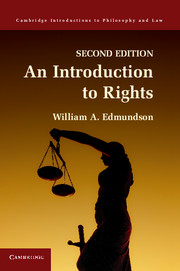Book contents
- Frontmatter
- Contents
- Preface to the First Edition
- A Note on the Second Edition
- A Note on Citation Form
- List of Tables
- Part One The First Expansionary Era
- Part Two The Second Expansionary Era
- 6 The Universal Declaration, and a Revolt Against Utilitarianism
- 7 The Nature of Rights
- 8 A Right to Do Wrong? Two Conceptions of Moral Rights
- 9 The Pressure of Consequentialism
- 10 What Is Interference?
- 11 The Future of Rights
- 12 Conclusion
- Bibliographical Notes
- References
- Index
12 - Conclusion
from Part Two - The Second Expansionary Era
Published online by Cambridge University Press: 05 June 2012
- Frontmatter
- Contents
- Preface to the First Edition
- A Note on the Second Edition
- A Note on Citation Form
- List of Tables
- Part One The First Expansionary Era
- Part Two The Second Expansionary Era
- 6 The Universal Declaration, and a Revolt Against Utilitarianism
- 7 The Nature of Rights
- 8 A Right to Do Wrong? Two Conceptions of Moral Rights
- 9 The Pressure of Consequentialism
- 10 What Is Interference?
- 11 The Future of Rights
- 12 Conclusion
- Bibliographical Notes
- References
- Index
Summary
Moral rights, I have argued, are best understood as protected choices. The protection may be against interference by others or by the state, but may also be against deprivation by natural circumstances, by bad luck, or by the right-holder’s own bad decisions. The protection moral rights afford comes in degrees. I introduced the idea of proportionality and standing norms to explain how it can be that one can have a right to do wrong. No one, I argued, has a right to do wrong with impunity; the question is, what sort of punishment is licensed by the bare fact that a right-holder has made a morally wrong choice? The answer, schematic though it may be, is: Something. Some social sanction, administered by some authorized actor. It may be as dire as capital punishment, or it may be as slight (is it slight?) as scorn, ridicule, and ostracism. But moral wrongness has its bite, just as having a moral right has its.
Those who think that rights have grown all out of proportion to responsibilities are in an obscure way trying to draw attention to this fact. Having a right (understood according to the protected-choice model) does not entail having a moral permission to do what one has a right to do, nor does it entail that others are duty-bound not to apply sanctions (short of interference) in response to one’s exercise of one’s right. But having a right, per se, entails no duty whatever on the part of the right-holder. The right-holder will normally have duties, but these are not logically derivable from the rights she has. Although many of her duties are derivable from reciprocal rights others may have, the concept of rights, standing alone, does not logically entail more than this. Moreover, as we have seen, having a right to do something is never, by itself, a reason to do it. In fact, there may be good, even decisive, reason against doing it. The concept of rights, as important as it certainly is, cannot be the whole story. Rights tell us something about how we may live, and quite a lot about how we may not live. But they do not tell us how we would best or most happily live.
- Type
- Chapter
- Information
- An Introduction to Rights , pp. 160 - 162Publisher: Cambridge University PressPrint publication year: 2012

